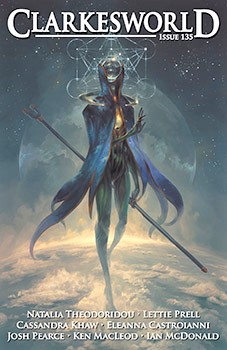 Clarkesworld #135, December 2017
Clarkesworld #135, December 2017
“The Rains on Mars” by Natalia Theodoridou
Reviewed by Victoria Silverwolf
All five stories offered in the latest issue of this award-winning magazine feature protagonists yearning for escape from painful situations.
The narrator of “The Rains on Mars” by Natalia Theodoridou is one of a team of workers laboring to construct an underground colony on the red planet. He has painful memories of the death of his brother on Earth. His hallucinations of rainfall on Mars lead to tragedy. Despite its extraterrestrial setting, this is primarily an introspective tale of mourning and regret.
“Crossing LaSalle” by Lettie Prell takes place in a future when machines can replace the flesh of the elderly or those with terminal diseases. A healthy young woman desperately wants to undergo the procedure. She violates the law in order to enter the area where those with robotic bodies dwell. The reason for her quest does not appear until the end of the story. The reader may not agree with her decision but is likely to empathize with her emotional suffering. (The first two stories in this issue feature minor characters who prefer the pronoun “they” rather than “he” or “she.” The intent in both cases seems to be to create a futuristic feeling.)
Racecar drivers and space explorers directly connected to their vehicles appear in “Falling in Love with Martians and Machines” by Josh Pearce. The narrator travels with a racer who accumulates wealth through his victories, and is willing to take dangerous risks in order to win. Both characters hope to escape Earth. Opportunity and danger appear when the racer faces an unexpected challenge. This is a fast-paced, action-packed story with the flavor of cyberpunk. Many readers will find the main characters unpleasant.
“Darkness, Our Mother” by Eleanna Castroianni is a science fiction retelling of the legend of the Minotaur. The narrator’s brother, a mutant with a bull’s head, dwells inside the starship that carried their ancestors in the remote past. Like her mother, the narrator has the ability to use mathematics to alter physical objects. Her father usurps the mother’s reign and brings an unwanted suitor for his daughter. The author’s use of ancient mythology is clever, but the heroine’s odd mathematical power is never quite clear.
Time and space separate two lovers in a strange way in “Landmark” by Cassandra Khaw. They remain in communication through the narrator’s surrogate body. Brief and poetically written, this story is emotionally effective but somewhat opaque, with little plot.
Victoria Silverwolf does not refer to herself as “they.”